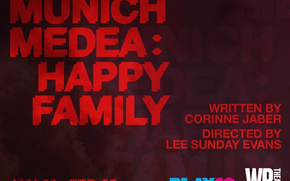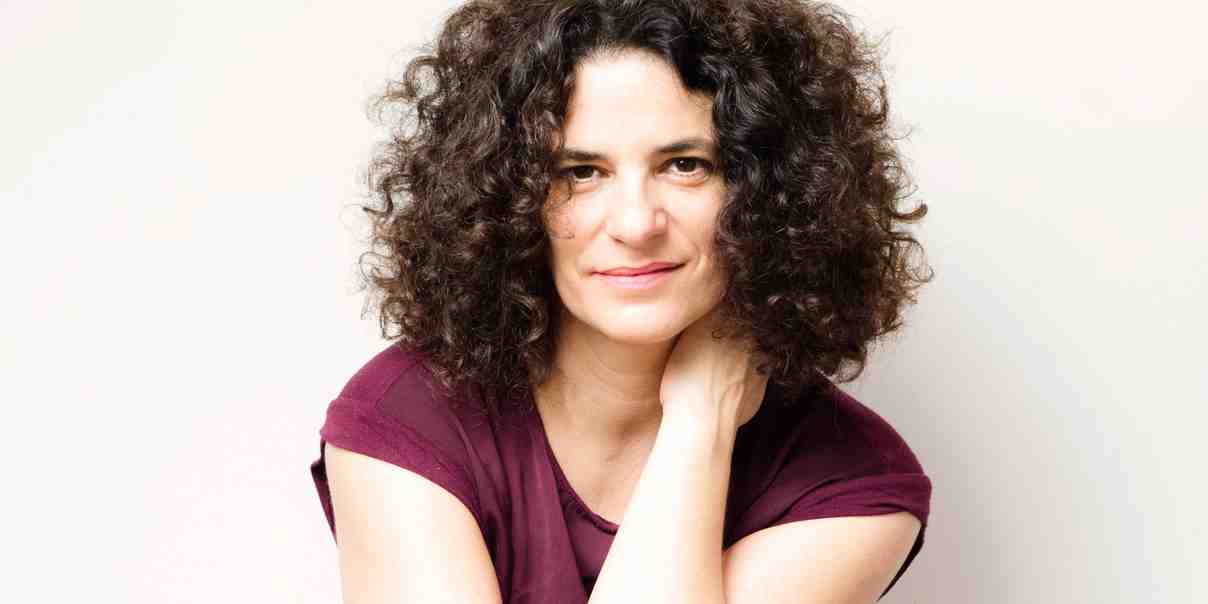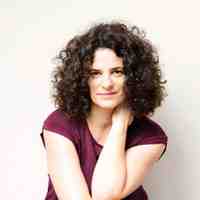

Commitment & Practice: A Conversation with Corinne Jaber
Meet the Participants

Corinne Jaber (Writer) is of Syrian/German heritage and was born in Munich and raised in Canada and Germany. She is an award-winning actress as well as a writer/director. She has been part of many international theatre productions in English as well as in French, such as - to name but a few - Peter Brook’s The Mahabharata, A Dybbuk for 2, by and with the late Bruce Myers, Irina Brook's Beast on the Moon (for which she obtained a “Molière” the best actress award in France) and more recently Oh My Sweet Land, a monologue which she conceived and co-authored together with Amir Nizar Zuabi as well as acted in. For many years she has worked with Afghan actors in Kabul on Shakespeare. Their work culminated in a production of Comedy of Errors at the “Globe to Globe Festival” for the Globe Theatre in London. Her play The Bus that didn’t stop on the Partition of India has now developed into her very first film Borderlines which she also produced and directed. She is currently in the process of post-production.

Kate Loewald (she/her/hers) co-created The Play Company with her late partners, Mike Ockrent and Jack Temchin. Prior to launching PlayCo, from 1990-99 she was Director of Play Development at the Manhattan Theatre Club, and also directed their Writers in Performance series for two seasons. Before MTC, Kate worked for producer Margo Lion, developing and producing shows on and off Broadway including George C. Wolfe’s Jelly’s Last Jam and Martha Clarke’s The Garden of Earthly Delights. She was a dramaturg at the O’Neill Playwrights Conference 2000-2003. In addition to her work with PlayCo, she was the Guest Artistic Director for the Signature Theatre Company in the 2004/2005 season. She is an Adjunct Assistant Professor at the Columbia University School of the Arts, and has also taught The New School, Fordham College and NYU. She is a fellow at The Witness Institute.
In 2017, PlayCo produced the U.S. premiere of Oh My Sweet Land, written by Amir Nizar Zuabi in collaboration with Corinne Jaber. In 2019, Corinne sent me her play Munich Medea: Happy Family and we made direct contact for the first time. With Munich Medea now open and running in our co-production with WP Theater, we have time for a conversation about Corinne's work overall and artistic practice. She seems to be constantly in motion - performing in Paris, teaching an acting workshop in Armenia, filming in Pakistan. In whichever role - writer, actor, director - and whichever medium she chooses for a particular project, she gathers people in to experience intense and beautifully rendered stories that resonate with timeless narratives (a Greek tragedy, a Shakespeare comedy) while also being urgently of the moment.
Kate Loewald: I'd love to learn about the foundational experiences you've had as an artist and how they set you on your path. Are there one or two you can tell us about?
Corinne Jaber: I always seem to come back to Peter Brook in all of my work. Working with him has been so deeply formative to everything I do and I am still drawing from and being nourished by that experience in multiple and surprising ways.
I would describe it as the never ending search and commitment to truth in theatre. And what does that mean, being truthful, to a piece of writing, to the character you’re playing, to the audience you’re in front of? How to tell a story in as simple a way as possible and have it be theatre, that is, have it be a form of communion?
Improvisation as the foundation and also the chore of any theatrical work. And looking upon working on a play as a process that is ongoing, one that is not over when rehearsals end.
I have also been hugely inspired by Thomas Ostermeier. His capacity to relate to and incorporate the audience into his works, which is again connected to the art of improvising.
KL: You were an actor first, I believe, and then moved into directing and writing more recently. As your artistic practice expands, how do these different creative roles inform each other in your work? Do you see yourself moving into one more than another in the future, or moving among them, and combining them on certain projects?
CJ: I think I am very fortunate to have been able to discover, explore and develop my practice in all these fields of theatre. I look upon them as being very complimentary. Being an actress facilitates the writing process and also means there is a deeper understanding and connection to the actor working with my words, which again feeds into the writing and the whole theatrical process. The same goes for directing. I see myself as moving among them more and more as if they were all interconnected and are one wonderful whole that I am part of.
KL: The scope of your work is wide. You work on new plays and classical texts from many different parts of the world. What's important to you about this broad range of work? How does it serve you as an artist?
CJ: I feel that as an artist we have no more choice in the times we live in but to make our work about where we are now. This world has become an extremely difficult and very contradictory place, and understanding it and coming to terms with it is more and more of a challenge. Everything is moving forwards at an accelerated pace. People being forced to move from where they belong at an accelerated pace.
Because of my multi- cultural heritage and having lived in different countries and speaking several languages I feel at home in many different parts of the world and am drawn to them. I am close to these places and feel that I understand them. I feel that my artistic practice and the person who I am are more and more intertwined.
KL: It seems to me you are on a lifelong artistic journey that is taking you around the world as you encounter and collaborate with an astounding cast of characters - from iconic artists like Peter Brook, who directed you in The Mahabharata, to fledgling artists in Armenia, students at Boston University, actors in Afghanistan, and theatremakers in India. Looking ahead, are there particular stories and/or particular people you're hoping to work with? What kind of work are you dreaming of?
CJ: I am very much hoping to go back to the Mahabharata and start research work on an extraordinary piece of poetic writing: Until The Lions by Karthika Nair.
I would love to work with Thomas Ostermeier.
And more Shakespeare as an actor, always and forever!
And develop another film project as a writer.
I am dreaming of more collaborative work where we artists unite and join our creative forces and work collectively in a more open and supportive way.
Related Media
Related Productions

Written by
Kate Loewald
